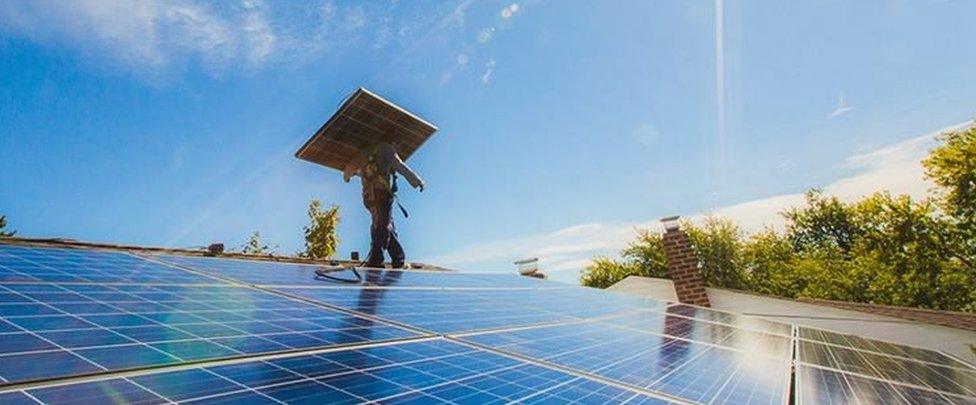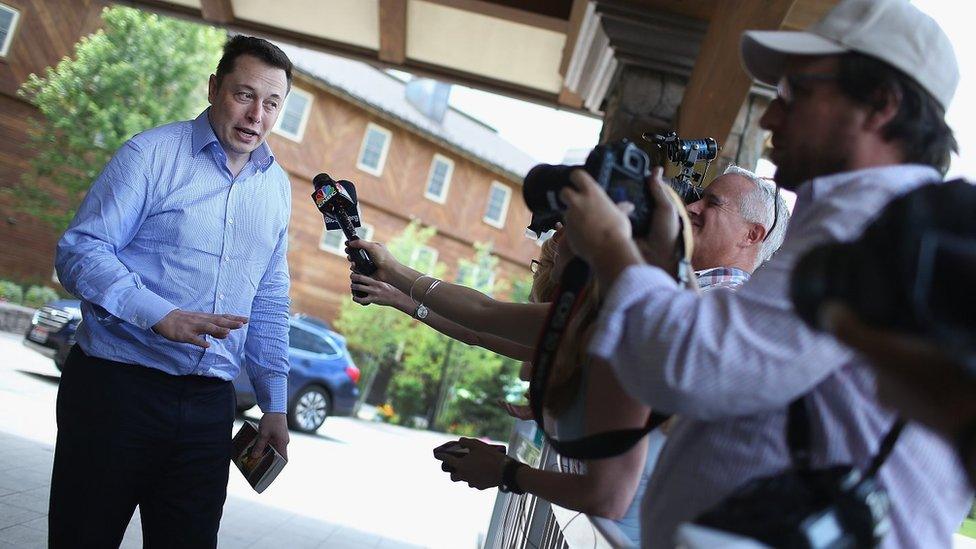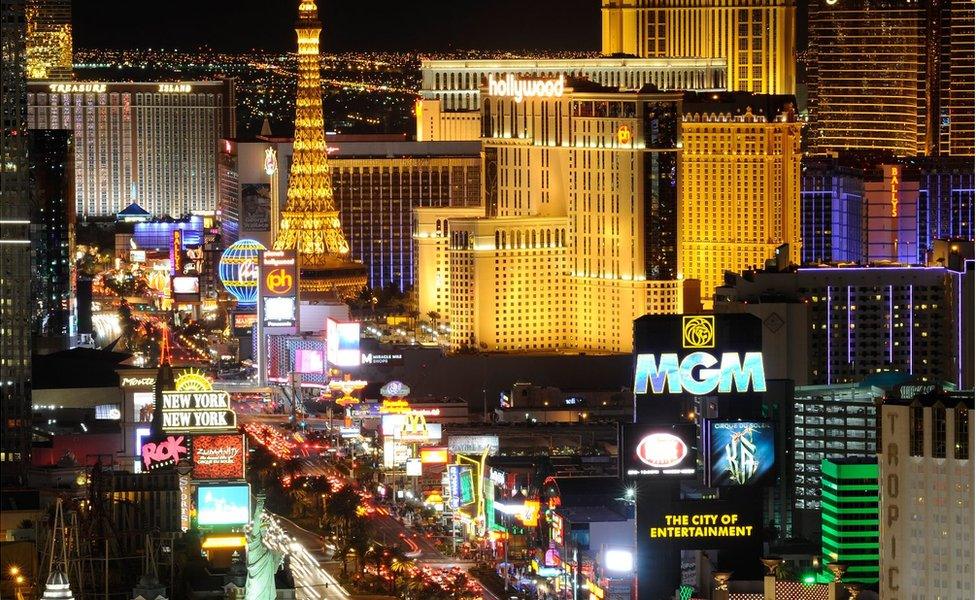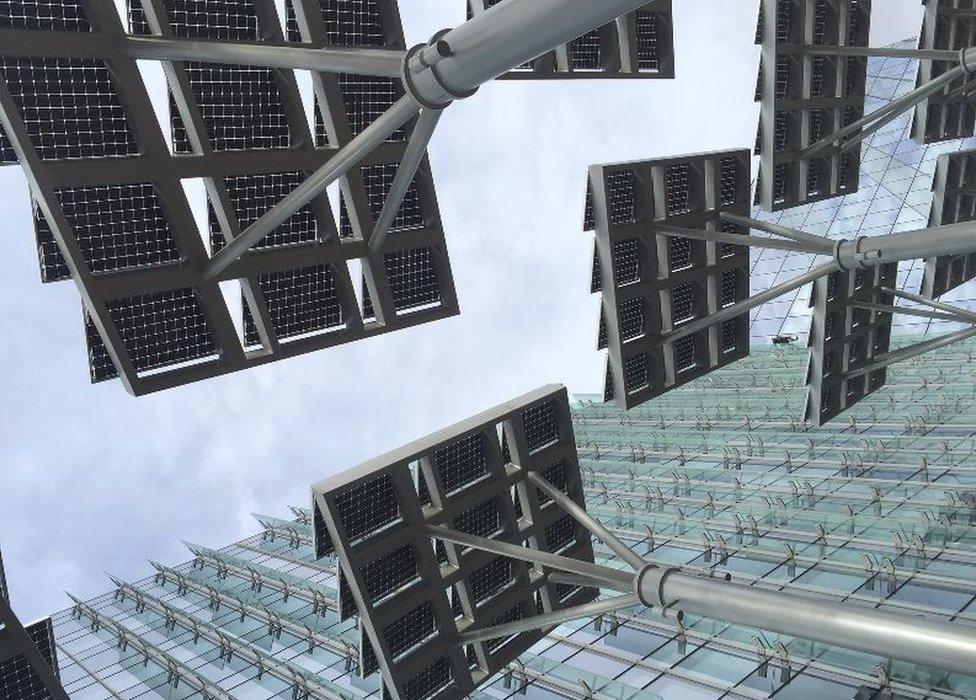CES 2016: Clouds over Nevada’s solar revolution
- Published
- comments
SolarCity is turning its back on Nevada
Las Vegas must be a prime contender for the title of world capital of waste.
Millions come to waste their money in the casinos, and the city in the desert sucks up water and energy on an epic scale. But in recent years Las Vegas has also become a pioneer in solar energy, with casinos and thousands of homes now looking to go green while saving money.
Now though, the solar boom could be over amid a bitter row which pitches the energy regulator and Nevada's monopoly energy provider against one of Silicon Valley's boldest entrepreneurs.

SolarCity takes care of planning permits and then installs, monitors and repairs solar panels on behalf of its customers - they pay off the cost over time, somewhat like a multi-year mobile contract
For SolarCity, which has led the drive to persuade thousands of Las Vegas residents to put panels on their roofs, is chaired by Elon Musk, the man behind the Tesla electric car and the SpaceX rocket business.
He's not known for being indecisive, and the moment the Nevada Public Utilities Commission changed the rules to make solar energy less attractive, SolarCity announced it was pulling out of the state.
When I visited the firm's big warehouse just outside Las Vegas, a fleet of trucks stood idle and a space that had been full to the roof with solar panels just a couple of weeks earlier was nearly empty.
Nevada had been the fastest growing market of the 19 states where SolarCity operates - and given how much sunshine there is here normally you can see why.

SolarCity is headed by the tech entrepreneur Elon Musk
But an added incentive for households to go solar was the payments they received from Nevada Power when they pumped excess energy back into the grid.
The energy firm argued that people with solar panels were effectively being subsidised by their neighbours who didn't have them. The regulator appeared to agree, ordering sharp cuts in the payments to solar customers and a big rise in what they pay to be connected to the grid.
Daren Judd, the regional operations manager for SolarCity, told me that the ruling made it impossible for the firm to continue taking on new customers in Nevada.
"We are no longer saving existing customers money, they are now paying more than if they didn't have solar," he said.
We went to visit one customer who had just had solar panels installed.

The Las Vegas strip requires a lot of electricity to power its huge hotels
Kelly Schwartze had noticed that several of his neighbours in Las Vegas suburb had gone solar, and decided it was a way of doing his bit for the environment while cutting his energy bills.
Now, he says the regulator's decision "feels like being hit by a truck."
His panels have yet to be switched on and connected to the grid and he is now not sure they ever will.
"They've pulled the rug from under us," he said.
Judy Treichel is in a worse position.
She's an anti-nuclear campaigner who decided to answer people asking where else America would get energy from by investing in solar power.
But unlike SolarCity customers who effectively lease their panels, she invested a large sum upfront.
"We worked out that it would pay back over eight years," she told me.
"Now we don't think it will ever pay back."
It must be said that even some solar energy supporters think there are good things about the regulator's decision - a cap on the number of solar homes that could be connected to the grid has been lifted. There is also some scepticism about the propaganda battle being waged by SolarCity.

SolarCity describes itself as the US's largest solar provider and employs more than 10,000 people
The Nevada Public Utilities Commission couldn't do an interview but sent us details of the ruling which talks of costs being "unreasonably shifted" away from solar customers to others, who also end up paying more for the cost of maintaining the grid.
Here, just as in many places, the economics of solar energy are complex and a matter of fierce debate between supporters and opponents. But as the technology improves and large scale manufacturing of solar panels brings their price down, the outlook is getting ever brighter.
Solar energy may have encountered stormy weather in Nevada, but tech entrepreneurs like Elon Musk are betting that the sun will soon shine brightly on their solar investments.